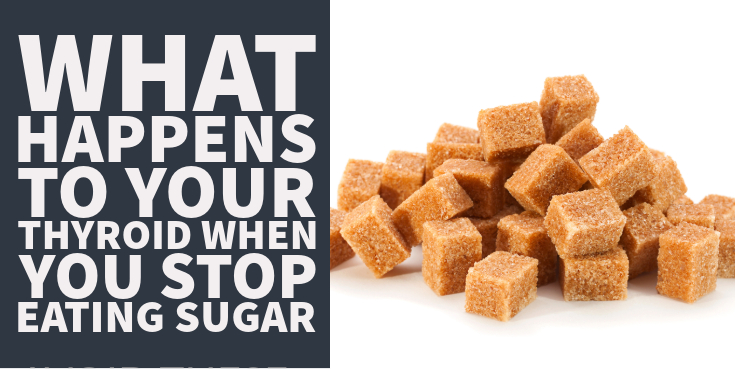The more refined and processed sugar that you eat, the worse off your thyroid will be.
Which means that the opposite is also true:
Avoiding processed sugar is one quick way to improve your thyroid and help you feel better.
Here’s what happens to your thyroid and your body when you give up sugar:
DOWNLOAD FREE RESOURCES
Foods to Avoid if you Have Thyroid Problems:
I’ve found that these 10 foods cause the most problems for thyroid patients. Learn which foods you should avoid if you have thyroid disease of any type.
The Complete List of Thyroid Lab tests:
The list includes optimal ranges, normal ranges, and the complete list of tests you need to diagnose and manage thyroid disease correctly!
#1. Your Thyroid Hormones Will Be More Balanced
Here’s why:
Sugar consumption tracks hand in hand with inflammation such that the more sugar you eat, the more general inflammation that exists in your body (1).
This is bad for most organs, but especially your thyroid.
Inflammation leads to accelerated aging of your skin and joints (2), damage to your heart and kidneys, and an imbalance in your thyroid hormones (3).
When inflammation is high, your body is less efficient at activating and using thyroid hormone.
When you eliminate your intake of processed sugar, your body can start to create more of the most powerful thyroid hormone, T3.
This leads to better balance in your T4:T3 ratio and means your thyroid can do its job helping you manage your weight, grow your hair, and maintain a stable mood.
It’s also going to have a huge impact on other organs and tissues downstream.
#2. It Will Be Easier To Lose Weight
This is for two reasons:
The first, obviously, is that because your thyroid regulates your metabolism, if your thyroid is working better then you are going to burn more calories at baseline.
The second has to do with a combination of calories and the impact processed sugar has on insulin.
We can use sugar-sweetened beverages as an example here.
One study showed that for each serving of sugar-sweetened beverages consumed, BMI increased by .24 and the risk of obesity increased by 60% (4).
A big part of this is because you can easily down a can of soda with 30+ grams of sugar without it impacting your appetite at all so it’s easier to eat far more calories than your body needs without realizing it.
When you cut out processed sugar, you’ll have better control over your appetite and it will be easier to consume the right amount of calories for your body and thyroid.
As an added bonus, cutting your sugar intake will cause an almost near-immediate drop on the scale.
It’s mostly water weight from muscle glycogen (5), but it is still a welcomed benefit.
#3. Your Skin Will Look Better
Drinking alcohol and smoking are two things known to accelerate the aging process but we can also add sugar to that list.
In order to have healthy skin, you must have functioning collagen and elastin.
These proteins provide structure to your skin and, when they degrade or are damaged, result in the signs of aging like wrinkles and sagging skin.
Glucose and fructose bind to both collagen and elastin, linking them together and forming what we call advanced glycation end products which prevents your body from repairing them (6).
The more sugar you consume, the faster this occurs, and the faster you will age.
This problem is compounded with thyroid dysfunction because thyroid function helps collagen do its job.

Removing processed sugar from your diet means you can slow down this aging process and you may very well see improvements in the quality and texture of your skin.
Many people are pleasantly surprised to find that eliminating sugar causes a slimming of their face.
Some of this is related to water loss and fat loss but there’s no doubt that thyroid function is playing a role as well.
And because your face and skin are often used as a subconscious marker of health and vitality by other people, the better your face and skin look, the healthier you will appear.
#4. Your Thyroid Gland Will Be Able To Better Protect Itself
The most common cause of thyroid disease in the United States and other developed countries is the autoimmune disease Hashimoto’s thyroiditis.
And not by a small amount, either.
About 70-90% of all hypothyroid cases are caused by this autoimmune disease.
And we know from studies that there is a bidirectional relationship between insulin resistance and the development of Hashimoto’s (7).
How does this connect to your sugar intake?
The more sugar you eat, the more likely you are to develop insulin resistance which means the more likely you are to develop thyroid antibodies.
Giving up sugar is one quick way to treat insulin resistance if you have it.
And doing this will mean better immune function and less thyroid gland damage.
This is one reason why I recommend that ALL patients with Hashimoto’s and hypothyroidism get tested for insulin resistance.
Treating it not only will help you lose weight, but it will also help your thyroid.
#5. You Will Have More Energy
Fatigue is one of the most common symptoms of having a sluggish thyroid and it stems from the body’s inability to create enough energy in the form of ATP.
This happens across the entire body which is why thyroid patients not only suffer from muscular fatigue, but also cognitive fatigue, depression, and brain fog.
It’s hard to think straight when your brain doesn’t have the energy it needs.
Eating lots of sugar also happens to cause low energy but for a slightly different reason.
The more sugar you consume, the more reliant upon sugar your body is as a source of energy.
This leaves you unable to tap into your fat stores in between meals, which are a much more stable source of energy.
If you can’t do this then you’ll experience a crash in between meals.
Cutting sugar from your diet solves this problem by boosting your thyroid and allowing you to tap into your fat stores.
Not only will you lose more fat as a result, but you’ll also have more stable energy throughout the day.
It also means you’ll have more control over your appetite which is next on the list.
#6. You’ll Have More Control Over Your Appetite
It’s not uncommon for people who eat lots of sugar to have very little control over their appetite.
They are caught in a vicious cycle where they feel hungry a few hours after eating which triggers cravings for sugar.
The more sugar they eat, the worse this cycle becomes, and the more cravings for sugar they have.
But here’s the thing, you can solve this problem by simply cutting your sugar intake.
Is it going to be easy? No, but after just a few days your sugar cravings will start to ease.
And after a few weeks, you will find that your taste buds have been resensitized to natural sugars which means whole foods like fruits will taste sweeter than you can imagine.
But in order to get there, you have to make it through the first few days which are always the hardest.
By the way, thyroid dysfunction also contributes to food cravings but through different mechanisms.
And by improving your thyroid, it will become much easier to control your appetite as well.
Sugar vs Carbohydrates vs Natural Sugars
Before you run out and eliminate all sources of sugar from your diet, there are a few things you need to know:
When I talk about sugar, what I’m really referring to are processed sources of sugar.
You should not confuse sugar with carbohydrates, even though sugar is a type of carbohydrate.
Some people will try to convince you that all carbohydrates are equally bad, but this isn’t the case.
Whole food sources of carbohydrates that contain natural sugars are completely fine and even healthy for your thyroid.
It’s the refined sources of sugar that are the problem.
These processed sugars come in different forms and are the ones linked to health problems like heart disease and diabetes (8).
I have never seen a study that links fruit or fruit juice consumption to heart disease, even though fruit contains tons of natural sugars.
In fact, studies show the exact opposite.
The more fruit juice you drink, the healthier your heart is (9).
The same can’t be said for sugar-sweetened beverages like soda.
And just so we are perfectly clear, here’s a list of refined and processed sugars that cause the problems I just mentioned:
- White sugar (also known as table sugar or granulated sugar)
- Brown sugar
- Powdered sugar
- Corn syrup
- And High fructose corn syrup
These are completely different from whole food sources of simple and complex carbohydrates which include things like:
- Fruits and fruit juices
- Vegetables
- Starchy vegetables like potatoes
- And Milk
And you can even have natural sources of sugar, in moderation, of course, which includes things like:
- Honey
- Maple syrup
- Agave
- Date syrup
Understanding the difference between these three groups is key.
If any of this information is confusing, stick to this rule:
Always avoid processed and refined sugars but don’t be afraid of whole foods.
And, by the way, if you want to learn why your thyroid needs 100 grams of carbohydrates each day then I’d recommend checking out this article next.
Scientific References
#1. https://pubmed.ncbi.nlm.nih.gov/36119103/
#2. https://pubmed.ncbi.nlm.nih.gov/20620757/
#3. https://www.ncbi.nlm.nih.gov/pmc/articles/PMC4802023/
#4. https://www.ncbi.nlm.nih.gov/pmc/articles/PMC3210834/
#5. https://www.ncbi.nlm.nih.gov/pmc/articles/PMC6019055/
#6. https://pubmed.ncbi.nlm.nih.gov/20620757/
#7. https://www.ncbi.nlm.nih.gov/pmc/articles/PMC8253084/
#8. https://www.ncbi.nlm.nih.gov/pmc/articles/PMC5793267/
#9. https://www.ncbi.nlm.nih.gov/pmc/articles/PMC8275541/









